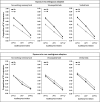Phonetic recalibration does not depend on working memory
- PMID: 20437168
- PMCID: PMC2875474
- DOI: 10.1007/s00221-010-2264-9
Phonetic recalibration does not depend on working memory
Abstract
Listeners use lipread information to adjust the phonetic boundary between two speech categories (phonetic recalibration, Bertelson et al. 2003). Here, we examined phonetic recalibration while listeners were engaged in a visuospatial or verbal memory working memory task under different memory load conditions. Phonetic recalibration was--like selective speech adaptation--not affected by a concurrent verbal or visuospatial memory task. This result indicates that phonetic recalibration is a low-level process not critically depending on processes used in verbal- or visuospatial working memory.
Figures


References
-
- Andersen TS, Tiippana K, Laarni J, Kojo I, Sams M. The role of visual attention in audiovisual speech perception. Speech Commun. 2009;51:184–193. doi: 10.1016/j.specom.2008.07.004. - DOI
-
- Baddeley AD, Hitch G. Working memory. In: Bower GH, editor. The psychology of learning and motivation: Advances in research and theory. New-York: Academic Press; 1974. pp. 47–89.
-
- Baddeley AD, Logie RH. Working memory: the multiple-component model. In: Miyake A, Shah P, editors. Models of working memory: mechanisms of active maintenance and executive control. New York: Cambridge University Press; 1999. pp. 28–61.
MeSH terms
LinkOut - more resources
Full Text Sources

